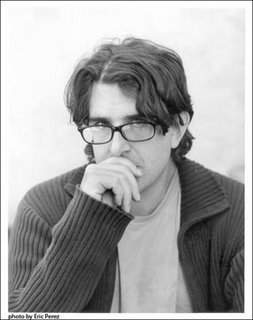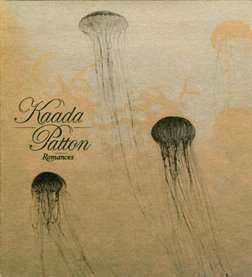Homeland Security

Brightblack Morning Light Loves Life In The Slow Lane
Story by Chad Radford
Photos by Thomas Campbell
Easing down the road, passing through Jamestown, ND, birthplace of Wild West author Louis Lamour and watching herds of buffalo shrink in the rearview mirror; Brightblack Morning Light is well in its element. Of these fading American icons it’s the open road that best symbolizes the nomadic duo Nathan Shineywater (Naybob) and Rachael Hughes’ (Raybob) musical spirit. With fellow travelers in tow, Elias Reitz (percussion), Ben McConnell (drums) and Mariee Sioux (vocals), alongside Naybob (guitar, vocals) and Raybob (Rhodes), Brightblack is touring in support of its self-titled second full-length, and Matador Records debut. It’s a sprawling and slow motion mantra that’s as sparse and haunting as the Badlands from which the group has just emerged. Amidst this desolate landscape, heading east on I-94, Raybob’s cell phone is cutting out.
It’s apropos that a device of such modern convenience doesn’t jive with Brightblack’s wayfaring lifestyle, willfully disengaged from most creature comforts. Raybob and Naybob lived in tents in rural Northern California while putting together this latest recording, despite the prospects of real record label backing. “I don’t see myself ever getting much out of living in a city,” Raybob declares as her distant though undeniable Southern accent clips out before disappearing into the cell phone void. Minutes pass before she’s back on the line without missing a beat. “Security is a façade and we’re not doing this for security or for what would be considered success. I don’t think I’ve ever really known what that word means and I don’t really care to.”
It’s the group’s drop-out pace and ideological ways that propel Brightblack across the country, inviting anyone within earshot to join Raybob and Naybob in their own back-to-the-basics headspace.
The group’s website (www.thebrightblackmorninglight.com) reveals even more of the hippie ethos by which the group lives. Icons of teepees and hawks in flight open up to reveal direct action sites for organizations such as “EarthFirst,” “Free Leonard Peltier” and the “Rainforest Action Network."
Although these politically and environmentally conscious leanings are never made apparent in Brightblack’s songs, they are indelible parts of the group’s personality. “You can talk with people and have these intense connections about what needs to happen in terms of the administration or the environment but it ends when the conversation ends,” she explains. “We’re in the van and going to play our music but we’re not into play protest songs or anything like that. The least I can do is talk about these kinds of things in interviews or post them on the website just to make people think.”
The growth that has occurred between Brightblack’s 2004 debut, Ala. Cali. Tucky (Galaxia) and the more recent self-titled release is tremendous. “It was a big step for us,” Raybob adds. “Everything was so new with Ala. Cali Tucky. It was our first try and we only had a certain amount of time and a certain amount of money. With this record we had more time and a little bit more money, and we learned a lot from the recording process. It’s all about knowing what you want.”
With the onset of “Everybody Daylight,” Brightblack Morning Lights' opening groove-laden number, it becomes apparent that these songs require much more than a casual listen. Brightblack’s songs reveal a scenic byway leading far away from the maddening crowd.
Songs like “Friend of Time” and “Fry Bread” quietly rumble with the natural tones emanating from the instruments at hand. Vast space separates each note so that every crackle of the needle on the record and every subtle nuance sprinkled into the songs shimmer with dreamlike majesty. “We Share Our Blanket with the Owl” congeals around a psychic hiss that’s embodied by a long, drawn-out snare clash that echoes into infinity.
 With two drummers rattling on various percussive instruments, a strong sense of rhythm drives each song, but never overpowers the subtleties. These elements form a dark and ghostly drone that feels as though it were lifted from the pages of a William Faulkner novel, which makes a much more appropriate comparison. After all, Brightblack’s earliest musical pairings happened in rural Alabama, somewhere between Montgomery and Birmingham, where they first performed under the name Rainywood. “We’re definitely still part of the Southern bloodline, we just can’t live there right now,” Raybob laughs, citing a list of traumas, ranging from arguing with family members over politics to not being able to find organically grown foods in the South. “We don’t feel like we can really live anywhere. That’s why being on the road and touring is right for us right now; because that’s all we really want to be doing.” And so the open road beckons.
With two drummers rattling on various percussive instruments, a strong sense of rhythm drives each song, but never overpowers the subtleties. These elements form a dark and ghostly drone that feels as though it were lifted from the pages of a William Faulkner novel, which makes a much more appropriate comparison. After all, Brightblack’s earliest musical pairings happened in rural Alabama, somewhere between Montgomery and Birmingham, where they first performed under the name Rainywood. “We’re definitely still part of the Southern bloodline, we just can’t live there right now,” Raybob laughs, citing a list of traumas, ranging from arguing with family members over politics to not being able to find organically grown foods in the South. “We don’t feel like we can really live anywhere. That’s why being on the road and touring is right for us right now; because that’s all we really want to be doing.” And so the open road beckons.(Originally published by Flagpole Magazine, Athens, GA.)



